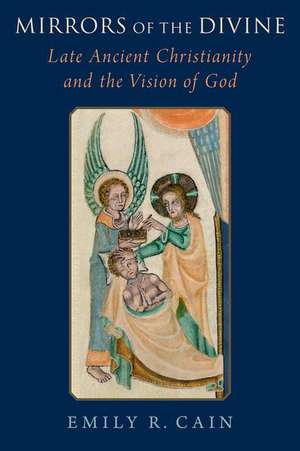Mirrors of the Divine: Late Ancient Christianity and the Vision of God
Autor Emily R. Cainen Limba Engleză Hardback – 28 mar 2023
Preț: 397.92 lei
Preț vechi: 468.14 lei
-15% Nou
Puncte Express: 597
Preț estimativ în valută:
76.15€ • 82.69$ • 63.97£
76.15€ • 82.69$ • 63.97£
Carte disponibilă
Livrare economică 02-16 aprilie
Livrare express 18-22 martie pentru 30.17 lei
Preluare comenzi: 021 569.72.76
Specificații
ISBN-13: 9780197663370
ISBN-10: 0197663370
Pagini: 224
Dimensiuni: 236 x 164 x 21 mm
Greutate: 0.48 kg
Editura: Oxford University Press
Colecția OUP USA
Locul publicării:New York, United States
ISBN-10: 0197663370
Pagini: 224
Dimensiuni: 236 x 164 x 21 mm
Greutate: 0.48 kg
Editura: Oxford University Press
Colecția OUP USA
Locul publicării:New York, United States
Recenzii
Cain's Mirrors of the Divine is ambitious; it is impressive to find a book that spans from Clement to Augustine, from Egypt to Cappadocia to modern-day Algeria. She takes up a significant and understudied topic—the idea of vision, at the intersection of ancient medicine, philosophy, and religion—and in doing so offers a social history that includes important and delightfully surprising turns, touching on everything from gender to ancient cataract surgery.
In Mirrors of the Divine, Cain offers a rich analysis of the powerful metaphor of vision in early Christianity. This is a compelling and detailed examination of the concept of 'visual subjectivity' in early Christianity. Cain illuminates the diverse ways in which early Christian authors theorized sight, especially one's vision of God, as shaping the Christian self. Cain deftly shows how the relationship between person and deity in so much of early Christian thought depended on even more ancient theories of vision developed by Plato, the Stoics, and other classical writers.
In this carefully researched and well-argued book, Cain explains how early Christians leveraged scientific, medical, and philosophical theories of vision to suit their argumentative needs. She shows how they used concepts of sight, optical illusions, mirrored reflections, or refracted distortions to grapple with constructions of self and other, spiritual piety, and knowledge of God. Cain's analysis persuasively demonstrates that visuality was much more than mere rhetoric, but rather essential to the very structuring of early Christian thought.
Cain's clear writing, skill at historical comparison, and mastery of a diverse range of primary sources and secondary literature made this book a joy to read; it is an excellent contribution that helps readers better understand metaphorical rhetoric, scriptural hermeneutics, and theological anthropology in the patristic era. This book should prove a stimulating conversation partner for systematic theologians writing on the beatific vision and perhaps even for pastoral/practical theologians exploring how "sight" language in scripture and Christian liturgies relate to spiritual formation in the Christian life.
Cain superbly integrates ancient optical theory into the discussions of Tertullian, Clement, Gregory of Nyssa, and Augustine. She decisively demonstrates that analyses of spiritual vision must be grounded in that writer's understanding of physical vision. She insightfully observed that each author combined more than one visual theory--and their combinations were different from one another - leading to different anthropologies, sociologies, and theologies. Finally, I appreciate Cain's emphasis on how our "flawed" bodies are not only something to be overcome but are the vehicles of our transformation.
Cain situates Mirrors of the Divine as an excellent starting point for scholars of each of these authors, regions, eras and themes.
In Mirrors of the Divine, Cain offers a rich analysis of the powerful metaphor of vision in early Christianity. This is a compelling and detailed examination of the concept of 'visual subjectivity' in early Christianity. Cain illuminates the diverse ways in which early Christian authors theorized sight, especially one's vision of God, as shaping the Christian self. Cain deftly shows how the relationship between person and deity in so much of early Christian thought depended on even more ancient theories of vision developed by Plato, the Stoics, and other classical writers.
In this carefully researched and well-argued book, Cain explains how early Christians leveraged scientific, medical, and philosophical theories of vision to suit their argumentative needs. She shows how they used concepts of sight, optical illusions, mirrored reflections, or refracted distortions to grapple with constructions of self and other, spiritual piety, and knowledge of God. Cain's analysis persuasively demonstrates that visuality was much more than mere rhetoric, but rather essential to the very structuring of early Christian thought.
Cain's clear writing, skill at historical comparison, and mastery of a diverse range of primary sources and secondary literature made this book a joy to read; it is an excellent contribution that helps readers better understand metaphorical rhetoric, scriptural hermeneutics, and theological anthropology in the patristic era. This book should prove a stimulating conversation partner for systematic theologians writing on the beatific vision and perhaps even for pastoral/practical theologians exploring how "sight" language in scripture and Christian liturgies relate to spiritual formation in the Christian life.
Cain superbly integrates ancient optical theory into the discussions of Tertullian, Clement, Gregory of Nyssa, and Augustine. She decisively demonstrates that analyses of spiritual vision must be grounded in that writer's understanding of physical vision. She insightfully observed that each author combined more than one visual theory--and their combinations were different from one another - leading to different anthropologies, sociologies, and theologies. Finally, I appreciate Cain's emphasis on how our "flawed" bodies are not only something to be overcome but are the vehicles of our transformation.
Cain situates Mirrors of the Divine as an excellent starting point for scholars of each of these authors, regions, eras and themes.
Notă biografică
Emily R. Cain received her Ph.D. in History of Christianity in 2016 from Fordham University, where she specialized in Christianity in Late Antiquity. She is currently an Assistant Professor of History of Christianities at Loyola University Chicago.
